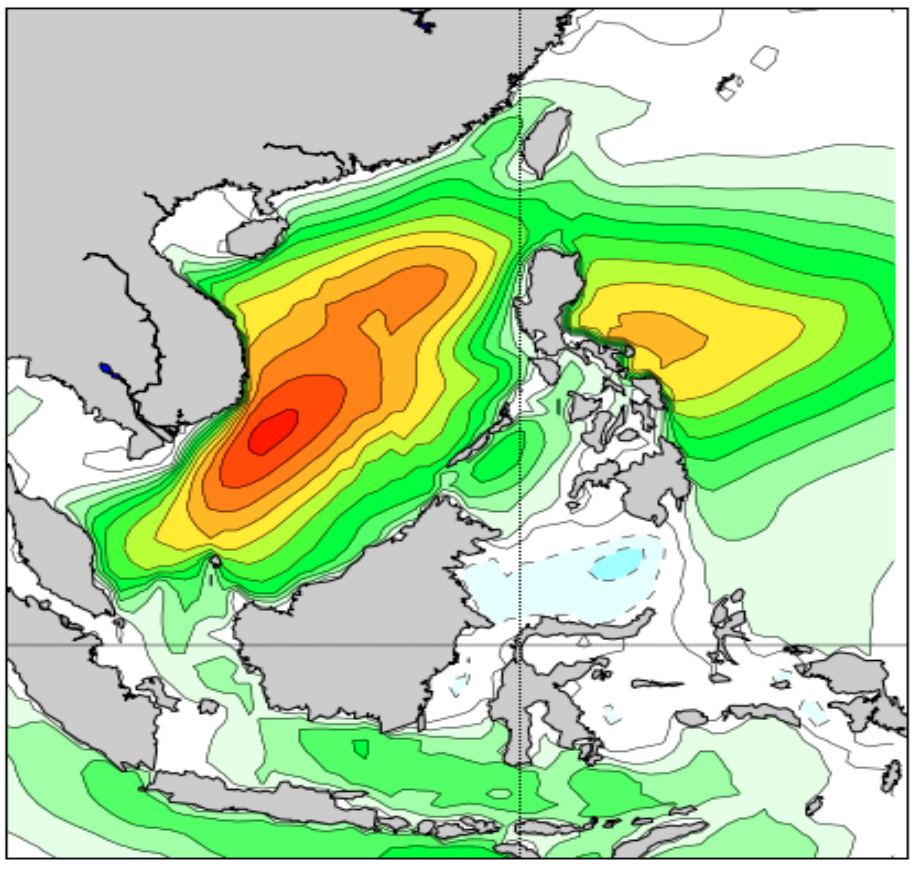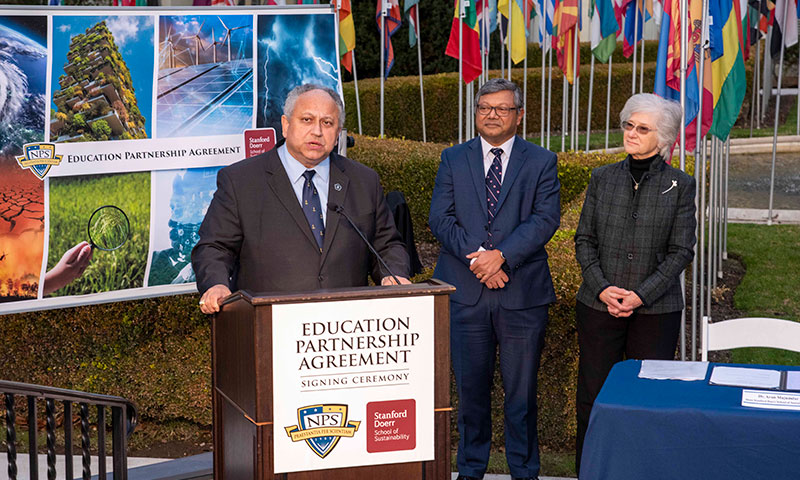The Naval Postgraduate School (NPS) is joining forces with the Stanford Doerr School of Sustainability to explore and address the increasing challenges of global climate change, energy security and sustainability – all significant issues facing the U.S. Navy and the nation as a whole.
NPS President Vice Adm. (ret.) Ann E. Rondeau and Dr. Arun Majumdar, inaugural Dean of the Doerr School of Sustainability, signed an Education Partnership Agreement (EPA) between the two schools during a brief ceremony on Dec. 15 at NPS. The ceremony was presided over by Secretary of the Navy Carlos Del Toro.
The EPA between NPS and the Doerr School brings together the defense-expert faculty and operationally experienced students of NPS with Stanford’s intellectual and technological leadership, as well as the research facilities of both institutions.
“Bold climate action is a mission imperative for the Department of the Navy, and we must harness all of the tools at our disposal in order to make urgently needed change,” said Del Toro. “This collaboration between the Naval Postgraduate School and Stanford University will bring together two globally recognized hubs of research and innovation, focused on realizing solutions that our Navy and our nation can employ now and in the future.”
In the DON’s climate strategy, “Climate Action 2030,” Del Toro identified climate change as “one of the most destabilizing forces of our time.” Rising sea levels, recurring flooding, extreme heat, drought and more frequent and destructive storms threaten Navy and Marine Corps installations in the continental U.S. on a regular basis, as well as impacting everyday operations at sea around the world.
 A sample ACAF product demonstrating some of the observed effects of climate change on ocean surface wave height.
A sample ACAF product demonstrating some of the observed effects of climate change on ocean surface wave height.
The Navy’s climate strategy highlights two major performance goals in its response: building climate resilience and reducing climate threats. But it also underlines the importance of leveraging and empowering the education of Sailors and Marines to meet the challenges of climate and energy security and sustainability through knowledge and innovation.
Stanford launched its Stanford Doerr School of Sustainability in May 2022. The school’s faculty and students work with collaborators locally and globally to understand the challenges they face and generate solutions at scale.
The Stanford Doerr School of Sustainability is Stanford’s first new school in 75 years and comprises multiple academic departments, including a newly established Oceans Department housed in the Hopkins Marine Station located in Monterey. It also incorporates the Woods Institute for the Environment and the Precourt Institute for Energy, as well as a Sustainability Accelerator to drive policy and technology solutions at scale. The school is also planning the creation of an Institute for Sustainable Societies.
The EPA between NPS and the Stanford Doerr School of Sustainability serves as a gateway to establish cooperative education opportunities, collaborate on applied research efforts, and work together on larger strategic initiatives aimed to address climate and energy security issues, and leverages the strengths of two globally recognized academic centers.
Under this cooperative effort, NPS students and faculty will have the unique opportunity to learn and work alongside Stanford counterparts in pursuit of joint research solutions to climate change, which has become the most complex and vexing challenge currently threatening naval forces, U.S. citizens and the world in general.
NPS supports Department of the Navy and Department of Defense efforts to combat climate change principally through its Climate and Security Network (CSN). The CSN provides a forum to advance NPS’ collective expertise on climate security and creates opportunities for interdisciplinary collaboration and information sharing. Through these efforts, NPS student and faculty have contributed to the development of key climate strategies and plans within the Department of Defense and conduct research to inform future force design, generation and deployment considerations.
“This agreement with NPS is part of how the Stanford Doerr School of Sustainability is an example of how we are approaching sustainability challenges like climate change,” said Majumdar. “We are creating a network of local and global partners who work alongside our scholars to find and scale solutions, and who provide opportunities for our students to gain hands-on knowledge. Bringing together the expertise and facilities of Stanford and NPS will advance research, education and impact to benefit all people.”
For years, NPS and Stanford have collaborated on research efforts, leveraging each other's strengths as well as their proximity in Northern California. Now, under the aegis of the EPA, NPS and the Doerr School of Sustainability will conduct joint research with the CSN and other NPS departments and groups, including the Energy Academic Group, Center for Infrastructure Defense, Meteorology, Oceanography, National Security Affairs, Defense Management and Engineering to investigate climate security, energy security, sustainability and more.
Together, the combined innovation ecosystems of NPS and the Doerr School of Sustainability will seek to deliver solutions at speed and scale, enabling climate-informed, data-driven decision-making by naval and national leaders. The climate research, discoveries, and solutions made by students and faculty from Stanford and NPS will enhance naval operational considerations and provide opportunities to develop, understand and improve upon multiple jointly developed technologies.
“The combination of expertise, operational experience, education and entrepreneurship in this partnership with Stanford and their Doerr School of Sustainability is truly unique and a powerful contribution to the global climate challenges ahead of us all,” said Rondeau. “We are grateful to Secretary Del Toro for his leadership and support of this partnership. Together we all share the same sense of urgency and bias for action. The problems of climate change cannot be solved in isolation. This agreement between NPS and Stanford takes our respective education and applied research to new levels, empowering our people to operationalize their ideas and innovations in pursuit of shared goals.”
The Department of the Navy and Stanford, through NPS and the Stanford Doerr School of Sustainability, are committed to expanding their collective understanding and actions in order to address climate change and mitigate its impacts through the education, empowerment and growth of America’s and the world’s future leaders. Additional details on this collaboration and opportunities will be provided in the coming weeks and months.
The Naval Postgraduate School provides defense-focused graduate education, including classified studies and interdisciplinary research, to advance the operational effectiveness, technological leadership and warfighting advantage of the Naval service. For additional information, visit NPS online at http://www.nps.edu.


